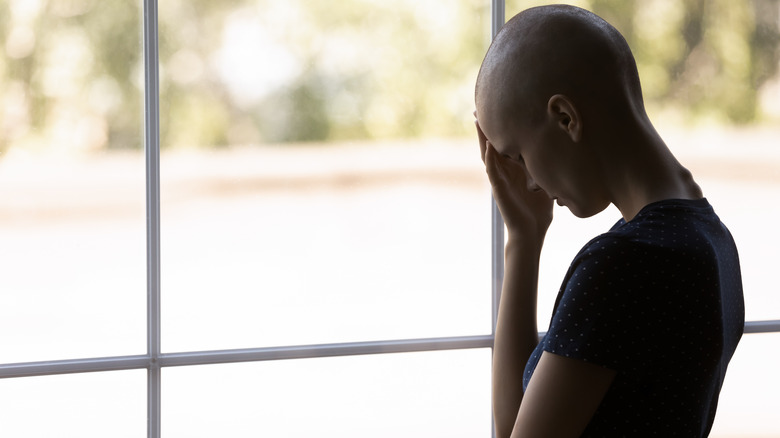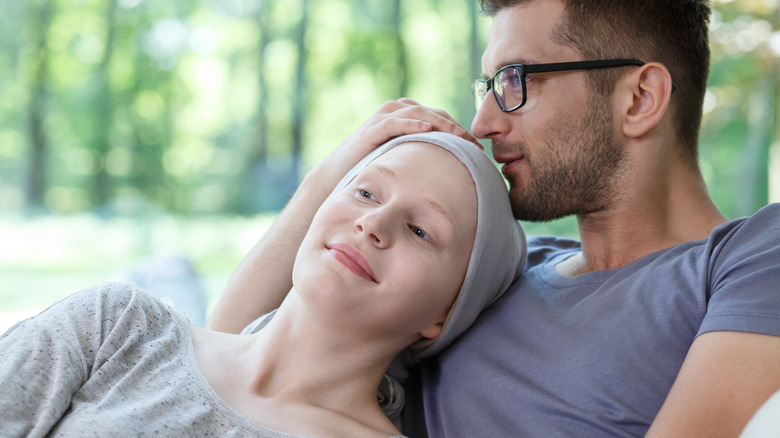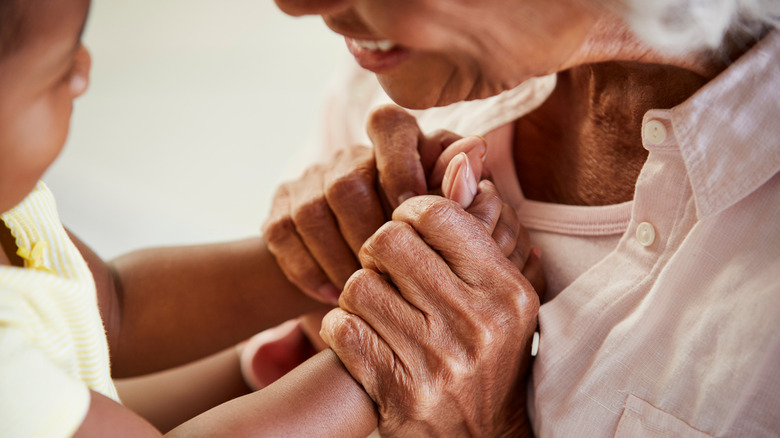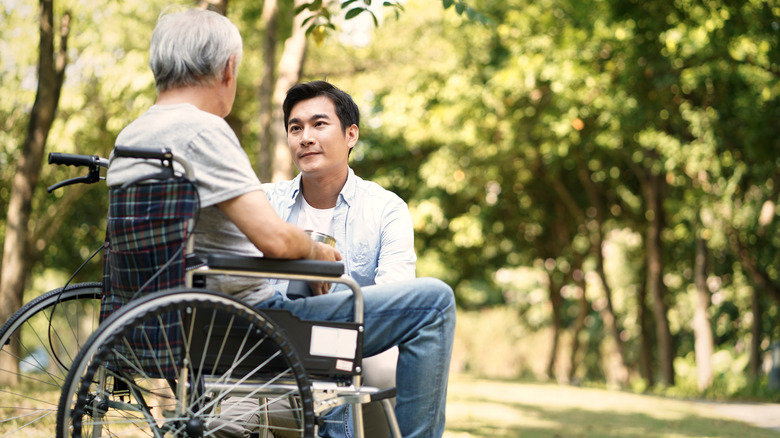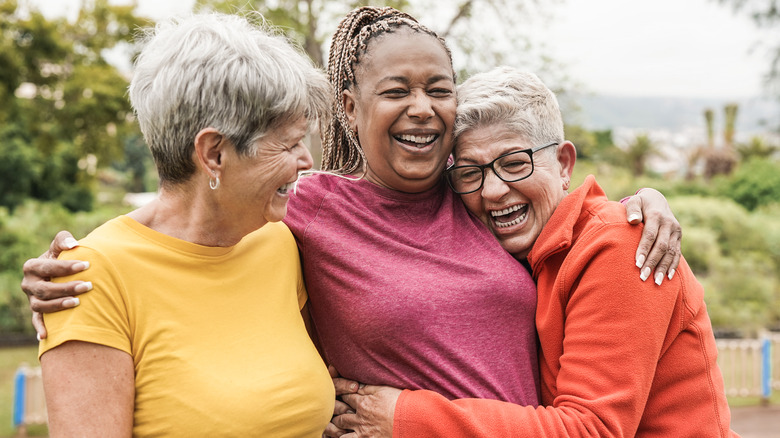What Most People Say Before They Die, According To Top Palliative Doctor, Simran Malhotra - Exclusive
For healthcare professionals who work in the field of palliative and hospice care, providing support for terminally ill patients can give a rare insight into questions many of us face when contemplating life and our own mortality. 'What really matters?' is the question many of us want to know.
Now, in an exclusive interview with Health Digest, leading palliative care and hospice specialist, Dr. Simran Malhotra, shares firsthand how her patients have influenced the way she leads her own life in hopes it will inspire others to do the same.
"If we allow it, death can be our greatest teacher," Dr. Malhotra explains. "It has a way of putting things into perspective and making us question our priorities. For me, working in palliative care has been a powerful reminder of what really matters in life. I hope that by sharing some of the most common regrets of my patients, it will inspire you to live a life with no regrets."
Common regrets in the end
When it comes to regrets, Dr. Malhotra asks patients about what holds personal meaning in their lives. "Two questions I ask almost all my patients are 'What brings you joy?' and 'What is most important to you?'" From these questions, I've found that people all have different stories, but their regrets are mostly the same nearing the end."
Dr. Malhotra says that many patient responses reveal common threads that center around self-love and interpersonal connection. She shares that one of the three common regrets most frequently voiced by patients was not spending more time with loved ones, including years lost with a loved one due to a trivial disagreement. Another common regret was having spent too much time on work rather than dedicating time to themselves or their families. Lastly, she has found that the third most common regret amongst patients was a lack of courage to pursue a life true to their innermost self, their passions, and their desires, rather than living for other people's expectations.
Everyone dies but not everyone lives well
In hearing about the regrets of her patients, Dr. Malhotra says there is a lot we can learn from their lived experiences. "Make time for your loved ones and don't take them for granted," she states. "Life is short, and you never know when it will be your last day with someone."
While work and everyday life will undoubtedly pull us in countless directions, regularly checking in with ourselves can help us determine if we're distributing our time and energy in a balanced way. "Work to live, don't live to work," offers Dr. Malhotra. "You'll never regret taking a break from work to spend time with your family or do something you enjoy. But you may regret working too much and missing out on the magic moments in your life."
In addition to investing time in those closest to us, Dr. Malhotra also emphasizes the value of investing time in ourselves. "Be true to yourself. Follow your heart and pursue your passions. Don't let others dictate how you should live your life. You'll be much happier looking back on a life lived authentically, even if it wasn't always easy," she states.
Common emotions people express before they pass
Although fear, anxiety, and sadness are among the most common emotions Dr. Malhotra sees patients experience before they pass, hope is the most predominant, she says. Many communicate their fear of the unknown, concerns about their families, anxiety about potential pain they may experience, and sadness around leaving the world and their loved ones behind. But there are many others who feel a sense of peace.
"I've seen patients suffering from crippling symptoms like pain, difficulty in breathing, social isolation, loss of control and independence. Yet the one thing that they all hold on to despite what they are going through is hope. A kind of fierce hope that anything is possible even in the darkest of moments and that there is always a chance of them getting better," she states.
Bearing witness to the array of emotions patients experience before they die has led Dr. Malhotra to reflect on the commonalities of the human experience. "The thing about palliative care is it shows you how similar we all are despite our differences. It gives you a front row seat on real love, courage, vulnerability, grief and ultimately the things that matter most. And at the end, it has become clear to me that we all want the same things. To be free from pain and suffering. To be surrounded by those we love. And to die peacefully in our own beds."
How a person's relationship to material objects may change near end of life
While our material possessions may be of the utmost importance to us in the present, Dr. Malhotra shares that it's not often what patients feel most proud of at the end of their lives. "Nobody has really ever shared with me bluntly like, oh, I'm so proud of the big house I had or the specific car I drove," she states. However, items that hold personal significance may begin to take on new meaning towards the end of a person's life, such as written letters.
Especially for younger patients, Dr. Malhotra promotes the idea of "legacy work," or finding ways to leave parts of ourselves behind for our loved ones. "I've done this personally with a few really young patients, is write out birthday cards for their kids until the age of 10 or 15 or record videos, especially nowadays with iPhones and tablets, it's very easy to keep those things for a long time, or create ways to feel like they're, one, in control of being able to share the things that are most meaningful to them. And number two, that they won't be forgotten, that they're leaving behind something if they don't have the time to live that life," Dr. Malhotra states. Legacy work is not only something she utilizes in her work with patients, but she practices it in her own life as well.
What dying people are usually most proud of at the end of life
Rather than material possessions, Dr. Malhotra states that it's personal relationships, milestones, or the accomplishments of a loved one that patients often communicate feeling the proudest of towards the end of their lives. "It's always about family," says Dr. Malhotra. "It's always about their relationships or about how they're so proud of their children or their great-grandchildren or the things that they're doing with their life and their education and the things that they've accomplished, that really is what it comes down to."
When taking stock of what we're most proud of, Dr. Malhotra suggests posing a series of guiding questions to ourselves, known as the rocking chair test. "When I'm 90 years old and I'm sitting in that rocking chair looking back on my life, what would I have wanted to accomplish and what would I be most proud of?" she says. When applying these questions to her own life, she asks herself, "Is this going to matter to me when I'm 90 years old? Is this something I'm going to be proud of? Is this something I'm going to say, I wish I would have [done]?" In doing so, Dr. Malhotra states that the rocking chair test can help bring about clarity when we're feeling conflicted in our day-to-day lives as to what ultimately matters most.
What people often say before they die
As a patient nears death, Dr. Malhotra states that their final words often vary based on a sense of fulfillment. "While my elderly patients often share things like 'I'm at peace and I've lived a good life,' that has not been the case for most of my younger patients," she states. "Their words simply come down to this, 'I'm not ready to die. I still have so much more living to do.'"
But Dr. Malhotra doesn't believe age is necessarily the differentiating factor. "I think it has less to do with age and more to do with a sense of unfinished business. The elderly have had more time to live their lives ... The young, on the other hand, are still in the midst of living. They still have so much potential and so many dreams yet to be realized. And that is why it is more difficult for them to come to terms with their own mortality and share words of acceptance."
What you can say to a dying loved one
It's not just the words of our dying loved ones that are important and meaningful. In fact, the words we say to those who are departing are just as important. In the midst of grief it can be so challenging to find exactly the right words. But Dr. Malhotra suggests it may be the simplest of endearments that can make the biggest impacts.
In offering advice to family members amid their final moments with a loved one, Dr. Malhotra states, "When the time does start to come near, I encourage all my patients and their families to share the things that matter most to them. The words 'I love you', 'Thank you', 'Please forgive me' and 'I forgive you' can mean the world to someone in their final moments, and I've seen firsthand how much of a difference it makes."
How lessons from those who are dying can help you live
Decades of work in the fields of palliative and hospice care have inspired Dr. Malhotra to live her life with intentionality. "Each [patient] has touched me in a different way, and some have directly changed the trajectory of my life. Their stories have empowered me, inspired me, challenged me, and changed me." Using her own life as an example, she states, "My patients and their families inspire me every day to stop holding back and fully embrace my heart. My love. My truth & intuition. My blessings. My purpose. My best self. And this one life that I have been gifted."
When it comes to living fully, Dr. Malhotra encourages individuals to share their story and to find strength in a community of people that inspires and uplifts them. "Don't be afraid to face your fears and embrace your vulnerabilities. These are the things that make us human and connect us to others. They are what make us real and raw and beautiful," she states. Emphasizing that we have the power to create the life we want for ourselves starting today, Dr. Malhotra encourages us to focus on what we can control and to fill our days with what makes us feel most alive.
She concludes with a powerful message, stating, "In the end, we are all just human beings desperately searching for connection, love and meaning in our lives. We want to be seen, heard and understood. We want to know that we matter. That our lives have mattered."
Simran Malhotra, MD, is a triple board certified physician and was named a "Top Doc" by Baltimore Magazine in 2019 & 2020 for palliative medicine. In addition to her expertise in palliative care, she's also passionate about lifestyle medicine and coaches high-risk cancer previvors on optimizing their lifestyle and mindset. You can find her on Instagram @drsimran.malhotra or visit her website www.coachsimranmd.com


